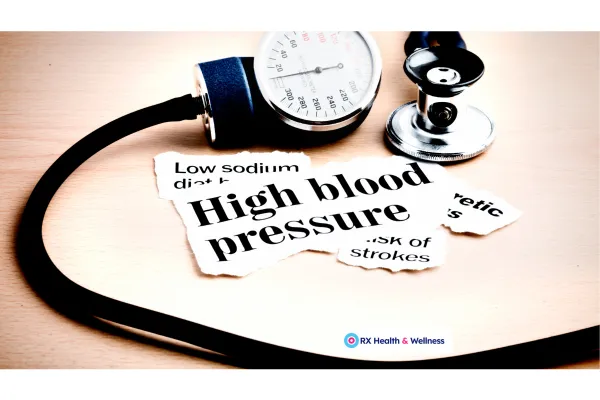
Understanding High Blood Pressure
Understanding High Blood Pressure (Hypertension)
Its Impact on Your Health
High blood pressure, or hypertension, is a common yet potentially serious health condition affecting millions worldwide. If left uncontrolled, hypertension can significantly increase the risk of heart disease, stroke, kidney disease, and other serious complications. Understanding its causes, risk factors, and management is crucial for long-term health.
What is High Blood Pressure?
Blood pressure measures the force of blood against the walls of your arteries. It is expressed as two numbers:
Systolic pressure (top number): Pressure when the heart beats.
Diastolic pressure (bottom number): Pressure when the heart rests between beats.
Hypertension is diagnosed when systolic pressure is ≥130 mmHg or diastolic pressure is ≥80 mmHg, according to the 2017 American College of Cardiology/American Heart Association guidelines (Whelton et al., 2018).
Complications of High Blood Pressure
Prolonged hypertension can damage multiple organs and increase the risk of severe health events:
Coronary Artery Disease: Narrowing of blood vessels supplying the heart.
Heart Attack (Myocardial Infarction): Blockage of blood flow to heart tissue.
Heart Failure: Chronic strain weakens the heart’s pumping ability.
Stroke: Disruption of blood flow to the brain, leading to tissue damage.
Kidney Disease: Damage to renal blood vessels may lead to chronic kidney disease.
Cognitive Decline: Hypertension is linked to increased risk of dementia and vascular cognitive impairment (Iadecola et al., 2016).
Symptoms of High Blood Pressure
Hypertension is often called the “silent killer” because it may present no symptoms until significant organ damage occurs. Possible signs include:
Dizziness or lightheadedness
Headaches, particularly in the morning
Fatigue or weakness
Flushed face or nosebleeds
Visual changes (retinal vessel changes on eye exam)
Risk Factors for Hypertension
Understanding risk factors can help in prevention and early intervention:
Overweight/Obesity: Excess weight increases cardiac workload.
Sedentary Lifestyle: Lack of physical activity raises blood pressure risk (Whelton et al., 2018).
High-Sodium Diet: Excess salt intake increases fluid retention.
Low Potassium & Vitamin D: Deficiencies can affect vascular function.
Alcohol & Tobacco Use: Excessive consumption damages blood vessels and raises blood pressure.
Chronic Stress: Psychological stress contributes to sustained hypertension.
Sleep Disorders: Sleep apnea is strongly linked to hypertension.
Diabetes & Insulin Resistance: Often coexist with high blood pressure.
Age & Sex: Risk increases with age; postmenopausal women face higher risk.
Genetics & Family History: Hypertension often runs in families.
Race/Ethnicity: African Americans have higher prevalence and complications.
Managing High Blood Pressure
Management requires a combination of lifestyle changes and, when necessary, medications:
Lifestyle Interventions:
Diet: Emphasize whole foods, fruits, vegetables, lean proteins, and low sodium intake (DASH diet) (Sacks et al., 2001).
Exercise: At least 150 minutes per week of moderate-intensity aerobic activity plus strength training (Whelton et al., 2018).
Weight Management: Maintaining a healthy BMI reduces cardiovascular strain.
Stress Management: Meditation, yoga, deep breathing, and mindfulness support blood pressure control.
Sleep Hygiene: Ensure adequate, high-quality sleep.
Limit Alcohol & Quit Smoking: Reduces cardiovascular risk.
Medication: When lifestyle changes are insufficient, antihypertensive drugs (e.g., ACE inhibitors, beta-blockers, diuretics) may be prescribed.
Importance of Early Detection
Regular blood pressure monitoring is essential because early detection allows:
Prompt lifestyle or medication interventions
Prevention of heart attacks, strokes, kidney disease, and cognitive decline
Tailored care for at-risk populations
Conclusion
High blood pressure is a common but serious condition with potentially life-threatening complications. With early detection, lifestyle modifications, and, if necessary, medication, it is possible to maintain optimal blood pressure and protect cardiovascular, renal, and cognitive health. Women, men, and older adults should be especially vigilant, as risks and manifestations may vary across populations.
References
Whelton, P.K., Carey, R.M., Aronow, W.S., et al. (2018). 2017 ACC/AHA/AAPA/ABC/ACPM/AGS/APhA/ASH/ASPC/NMA/PCNA Guideline for the Prevention, Detection, Evaluation, and Management of High Blood Pressure in Adults.Hypertension, 71(6), e13–e115.
Sacks, F.M., Svetkey, L.P., Vollmer, W.M., et al. (2001). Effects on blood pressure of reduced dietary sodium and the Dietary Approaches to Stop Hypertension (DASH) diet.New England Journal of Medicine, 344, 3–10.
Iadecola, C., Yaffe, K., Biller, J., et al. (2016). Impact of hypertension on cognitive function: A scientific statement from the American Heart Association.Hypertension, 68, e67–e94.
Carey, R.M., & Whelton, P.K. (2018). Prevention, detection, evaluation, and management of high blood pressure in adults: Synopsis of the 2017 American College of Cardiology/American Heart Association Hypertension Guideline.Annals of Internal Medicine, 168(5), 351–358.
Benjamin, E.J., Muntner, P., Alonso, A., et al. (2019). Heart disease and stroke statistics—2019 update: A report from the American Heart Association.Circulation, 139(10), e56–e528.
